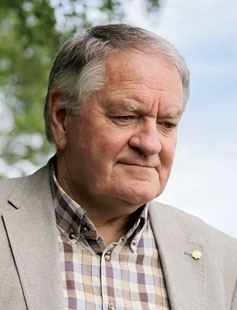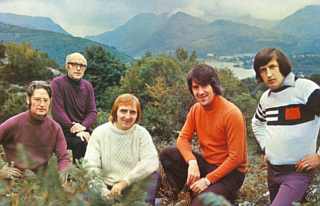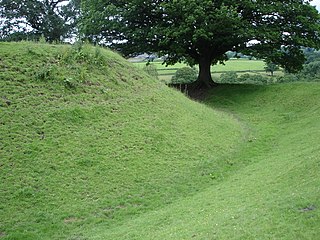"Marwnad yr Ehedydd" ("The Lark's Elegy") is a traditional Welsh folk song. A single verse was published by the Welsh Folk Song Society in 1914. [1] It was attributed to the singing of Edward Vaughan, Plas-rhiw-Saeson, collected by Soley Thomas.

"Marwnad yr Ehedydd" ("The Lark's Elegy") is a traditional Welsh folk song. A single verse was published by the Welsh Folk Song Society in 1914. [1] It was attributed to the singing of Edward Vaughan, Plas-rhiw-Saeson, collected by Soley Thomas.

Mi a glywais fod yr 'hedydd | I heard that the Lark |
There has been speculation that it is one of the oldest existing songs in Welsh, because the lark in the song may be a coded reference to Owain Glyndŵr and could have been written by one of his followers. [2] The single stanza has been 'exploded' [3] into longer songs at least four times. The first was by Enid Parry, [4] adding three more verses about other birds. Her words were also published in two books of Welsh folksongs. [5] [6]
A second version was written by Albert Evans-Jones (bardic name Cynan), [7] adding four verses again about other birds.
1. Mi a glywais fod yr ’hedydd, | 1. I heard that the lark |
This second version was used, for example, by Bryn Terfel on CD, [8] and by Arfon Gwilym for Trac Cymru (Folk Development for Wales). [9]
A slightly modified melody, compared to the original field-recording, is used in some publications and recordings. [10]

In 1979, Myrddin ap Dafydd created a third version of the words, based on the idea of it being about Glyndŵr, for the folk group Plethyn who released it on a cassette entitled 'Blas y Pridd', and subsequently in 1990 on a CD. [11]
During the celebration of the 600th anniversary of Glyndŵr's uprising, Myrddin ap Dafydd wrote a fourth version adding five verses to the original, entitled 'Mawl yr Ehedydd' (The Lark's Eulogy). [12]

Dafydd Iwan Jones is a Welsh singer and nationalist politician who rose to fame writing and performing folk music in the Welsh language. From 2003 to 2010, Iwan was the president of Plaid Cymru, a political party which advocates for Welsh independence from the UK.
Welsh poetry refers to poetry of the Welsh people or nation. This includes poetry written in Welsh, poetry written in English by Welsh or Wales-based poets, poetry written in Wales in other languages or poetry by Welsh poets around the world.
"Bugeilio'r Gwenith Gwyn" is an 18th-century traditional Welsh love song.

Hogia’r Wyddfa were a Welsh five-piece vocal group with a career in Welsh-language entertainment that lasted fifty years. One of the best-selling Welsh-language groups of the 1970s, they were awarded a gold disc for their 1975 album Caneuon Gorau.

Emyr Llywelyn Jones is a Welsh political activist, who was active during the 1960s and 1970s. Mudiad Adfer was established based on his philosophies, and those of Owain Owain and Professor J. R. Jones. Commonly known as Emyr Llywelyn, he is also known as Emyr Llew. He is the son of author and poet T. Llew Jones.
"Ar Lan y Môr" is a traditional Welsh folk love song. A single verse was published by the Welsh Folk Song Society in 1937, and again in 1948. A slightly different version was recorded by the BBC in 1953. Extra verses have been added, mostly from the 'Hen Penillion'.
Plethyn is a Welsh language folk music group that was at their zenith between 1978 and 1995. The members are Linda Healy, Roy Griffiths and John Gittins. The three members originate from near Meifod, Montgomeryshire, in mid-Wales. Roy Griffiths and Linda Griffiths are brother and sister, while Gittins was born on a neighbouring farm.
Myrddin ap Dafydd is a Welsh writer, publisher and chaired bard. In 2018 he was elected Archdruid of Wales.

"The Seagull" is a love poem in 30 lines by the 14th-century Welsh poet Dafydd ap Gwilym, probably written in or around the 1340s. Dafydd is widely seen as the greatest of the Welsh poets, and this is one of his best-known and best-loved works.

We'll Keep a Welcome is a 2000 album by singer Bryn Terfel of traditional hymns and folk songs associated with Wales. Terfel was accompanied on the album by the Orchestra of the Welsh National Opera, the Risca Male Choir and The Black Mountain Chorus. The majority of the songs are sung in the Welsh language.
Ieuan ap Gruffudd Leiaf was a Welsh uchelwr and bard, the son of poet Gruffudd Leiaf. His poetry, spanning the period c.1420 to c. 1470, has been fully edited. The earliest dateable poem that can be confidently assigned to him are a cywydd in praise of Gwilym ap Gruffudd ap Gwilym ap Gruffudd ap Heilin and his newly built home, Y Penrhyn, Llandygái. The context of this poem seems to be the tradition of the'cyff clêr', with Ieuan, a 'prifardd', answering the taunts of lesser bards. Rhys Goch Eryri was present at the celebration and composed a perhaps more well-known praise poem to Y Penrhyn and its owner. Shortly after this, Ieuan composed a cywydd satiring the River Llugwy, into which the poet fell on his way to Y Penrhyn one Christmas. A cywydd to Saint Anna, mother of the Virgin Mary and two other daughters also named Mary, attributed to Ieuan in the only manuscript in which it survives, could also be from the same period or earlier.
Arfon Gwilym is a Welsh folksinger, ballad singer, publisher and musician, originally from Rhydymain, between Dolgellau and Bala in Gwynedd. He is also known as a language campaigner through his work over the years promoting plygain singing and cerdd dant.

"Owain Glyndŵr's Court", also known as "Sycharth" or "The Court of Owain Glyndŵr at Sycharth", is a cywydd by the Welsh bard Iolo Goch. It describes and celebrates the hall and household of his patron, the nobleman Owain Glyndŵr, at Sycharth in Powys. It cannot be dated exactly, but was probably written about 1390, before Glyndŵr's revolt against the English crown. It survives in as many as 24 manuscripts.
"The Poet's Burial for Love" or "The Poet's Burial" is a Welsh-language love poem in the form of a cywydd in which the poet foresees his own death from unrequited love. It was formerly attributed to the 14th-century Welsh poet Dafydd ap Gwilym, but in 1952 was rejected from the canon of his works by Dafydd's editor, Thomas Parry and is now widely considered to be a 15th-century poem of uncertain authorship. The poem has nevertheless remained very popular with translators and it continues to appear in anthologies, including Thomas Parry's own Oxford Book of Welsh Verse.
"The Ruin" is a cywydd by the 14th-century Welsh poet Dafydd ap Gwilym, widely seen as the greatest of the Welsh poets. In it the poet, considering a ruined house and remembering the love-affair he once conducted there, reflects on the transience of all worldly pleasures. "The Ruin" is commonly supposed to have been written in Dafydd's old age. It has been called one of his most poignant poems, and it was included in The Penguin Book of Welsh Verse, The Oxford Book of Welsh Verse, The Oxford Book of Welsh Verse in English and The Longman Anthology of British Literature.
Gruffudd ap Maredudd ap Dafydd was a Welsh bard working in Anglesey in the service of the Tudors of Penmynydd. One of the last of the older school of poets known as the Gogynfeirdd, he resisted the innovations in Welsh verse-form which took place in his lifetime. About 2400 lines of his work have survived in the Red Book of Hergest. His best-known poem is "Gwenhwyfar", an elegy to a young lady. He was described by the literary historian D. Myrddin Lloyd as "the finest of all the late Gogynfeirdd poets" and by Saunders Lewis as "one of the greats".
Rhiannon Ifans, FLSW is a Welsh academic specialising in English, Medieval and Welsh literature. She was an Anthony Dyson Fellow at the Centre for Advanced Welsh and Celtic Studies, in University of Wales Trinity St. David. She twice won a Tir na-n-Og prize for her work and won the literary medal competition at the Welsh Eisteddfod, for her 2019 debut novel, Ingrid, which was chosen for the Welsh Literature Exchange Bookshelf. In 2020, Ifans was elected as a Fellow of the Learned Society of Wales.

"The Mirror" is a poem in the form of a cywydd by the 14th-century bard Dafydd ap Gwilym, widely seen as the greatest of the Welsh poets. The poem describes how Dafydd, languishing with lovesickness for an unnamed Gwynedd woman, is appalled by the wasted appearance of his face in the mirror. "The Mirror" can be grouped with several other of Dafydd's poems, possibly early ones, set in Gwynedd, or alternatively with the many poems in which he expresses his love for a woman he calls Morfudd. It has been called "perhaps Dafydd's greatest masterpiece in the genre of self-deprecation".

Welsh folk music refers to music that is traditionally sung or played in Wales, by Welsh people or originating from Wales.